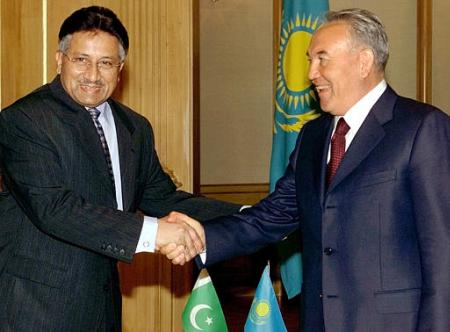
 Important progress in Kazakhstan
Important progress in Kazakhstan
Gregory Fossedal
September 24, 2004
Copyright © United Press
International
Kazakstan held national elections on September 19, prompting comments from a number of outside observers, and all the local opposition, that the vote was a step backwards for democracy. Was it that -- or was it just not as much progress as democracy-lovers around the world, including me, might hope for?
To answer that question, we need to decide what Kazak's admittedly sloppy democracy today is being compared to. The Kazakstan of severl years ago? Ten years ago? Other countries in the region? Russia or China? Iraq? Florida?
By most of these standards, the country seems to have made mild but steady improvement. Progress -- that is to say, motion towards a goal. Furthermore, considering Kazakhstan's geographic and demographic position, it's a steady improvement that's important to U.S. security and democracy in general.
Measuring a democracy's progress at the low end of development is a tricky matter, but Kazakhstan's recent vote appears to have at least two positive signposts.
First, the vote was held, and with numerous international observers. Some of these, especially as covered in the major press, had complaints about both voting mechanics and the social backdrop against which the vote took place -- especially including reports of "intimidation" of some voters on election day, and the lack of a paper trail from voting machines used by about 20 percent of the voters.

Emerging democrats: Kazakh President Nursultan Nazarbayev shakes hand with another vital ally in the war on terror, and emerging democrat, Pakistan's Pervez Musharraf. |
The most balanced report to emerge, by the Organization for Security and Cooperation, generated Western headlines saying the election "failed [the] democracy test" (The New York Times) and even was "fraudulent" (The Washington Times.) But the report itself noted a positive areas of "progress" as against previous Kazhak elections -- the relevant unit of comparison.
Professor Frederick Starr of Johns Hopkins, who was in Kazakhstan as an observer, judged the voting to be fundamentally improved over recent Kazakh standards. "Overall... the election was "a step forward, not withstanding the imperfections," he said in a statement issued in Astana on September 20. Unfortunately, such views were not widely quoted in the international press.
Second, and more important, if the results hold up, at least one opposition party will be seated in the Kazhak parliament. This is an important signpost in democratic development -- as the evolution of Mexico, the Philippines, Pakistan, Turkey, and other countries shows. Looking back at countries that have completed a successful democratic transition, opposition seating is normally a key inflection point.
This doesn't mean that Kazakhstan will be a full democracy shortly, or even in 5-10 years; the government could always crack down and reverse direction. It is, however, forward motion.
In social terms, Kazakhstan also parallels some of the developments seen in Mexico or the Philippines in the 1980s. Income is surging, the economy growing at an 8-12 percent pace each of the last five years. This in turn is generating a middle class with greater access to information, and insistence on freedom of expression.
Kazakhstan doesn't enjoy much of a domestic free press, for example. But foreign newspapers and magazines are available in most cities. Mobile telephone usage has more than tripled over five years. In 1997, there were as paltry 15,000 internet users. This rose to more than 70,000 in 2000, more than 150,000 last year, and probably exceeds 200,000 today.
That's still small for an emerging middle-income country with 16 million people. But of course, every such user has family, friends, and business associates. In emerging democracies, as in Poland in the 1980s, information can spread quickly. As well, Kazakhstan now has a number of independent service providers less amenable to direct government control.
The government has tried to block access to critical news sources at home and abroad. Such efforts, however, are generally doomed to failure unless one goes all the way and imposes direct, government-controlled net access only -- something the government has stepped back from doing. Sergei Duvanov of the Institute for War and Peace Reporting outlined how Kazakhs were able to get around many of the blocks in an interesting 2001 report. As well, President Nazarbaev, stung by international criticism of his efforts to regulate speech, has rescinded a number of the 1998-2000 decrees.
This is not to say that immutable economic or social forces will bring about a full Kazakh democracy no matter what the authorities do. Countries like China, for example, have much wider internet access and a larger middle class -- but still no elections, and no substantial opposition parties.
In Kazakhstan, however, the internet and other information sources act in combination with independent parties, muddy elections but elections nevertheless, and what should be a parliamentary opposition. And the government has moved gradually (tortuously gradually, perhaps) towards more freedom, not less, since the country achieved independence in 1991.
The election itself raised several problems. For example, a September 20 item in The New York Times, "Intimidation Alleged in Vote in Kazakhstan," starts with a quote harshly condemning the elections from Dos Kushyn, who is described as "the director of the Network of Independent Monitors," which placed 2,000 observers around the country.
This caught the eye of at least one seasoned Kazakh monitor who sent me a number of pre-election clips referring to approximately 1,000 accredited election observers in the country -- total, from all outside groups. How could one fellow, running an organization scarcely mentioned before, have 2,000 observers?
It turns out that Dos Kushyn is an opposition figure and whatever 2,000 "observers" he fielded, few were accredited. This doesn't mean what they said wasn't true. But neither should his complaints be taken at face value, still less as coming from a wholly disinterested group.
Most Western press quoting someone defending someone defending the election, or putting it in context, quoted only government officials. In other words, they presented criticism from independent sources, and praise only from the government, whose motives are likely to be questioned by any skeptical reader. What they didn't do was refer to the numerous independent observers, some cited above, who agreed that on balance, the election didn't meet Western standards -- but said it was an improvement.
The government also used voting machines, which are, indeed, a problem -- especially given that the computers Kasakhstan deployed, like some of those coming into use in a number of U.S. states, left no "paper trail." This is not a best practice. One can sympathize, however, with the government's decision to go with expensive, high tech systems from the West, thinking this would buy some credibility.
The U.S. -- which in contrast to Kazakhstan is grudgingly allowing Colin Powell to smuggle in a total of twenty (that's right, 20) international observers for its 2004 vote, having banned U.N. observers in many states -- should be a little reticent about raising this complaint.
Still less should U.S. policy aim at punishing the country with economic aid restraints and sanctions, as some in Congress have proposed.
Unlike other countries in what one observer has called "the scud belt," Kazakhstan doesn't need piles of aid (Turkey, Afghanistan, Iraq) to hold votes or stay on the democratic path. It hasn't built or tried to build nuclear weapons (Pakistan, India, China). It seems, knock on wood, to be moving the right way -- as opposed to Iran, Saudi Arabia, and others.
This is said not to criticize the other countries mentioned, but to point out that the Kazakhs are building democracy quietly and by tugging their own bootstraps, and without evident imperial ambitions or terrorist-nationalist resentments.
Kazakhstan is an important potential ally to the U.S., Russia, and its neighbors in the war on terror. It's also a potential bulwark for the faintly democratic tide among countries with large (about 45 percent) Moslem populations. There is a prospect of a ring of democracies on the borders of China and Iran, the better to raise the heat on those undemocratic states. And of large Moslem-population states -- Turkey, Indonesia, the Philippines, Mongolia, and potentially Iraq and Afghanistan -- as an example and proof that Islam need not be anti-democratic.
Thus Kazahstan is moving in a democratic direction -- too slowly, but not going the wrong way. The right response for friends of democracy is to offer encouragement. If matters reverse, it's time for some mild sticks. Right-way too-slow, by contrast, should bring soft applause, and some small carrots.
Gregory Fossedal is a senior fellow at the Alexis de Tocqueville Institution and the author of "Direct Democracy in Switzerland" and "The Democratic Imperative." His opinions are entirely his own and not necessarily those of UPI or AdTI.